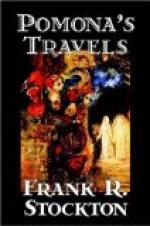When we got to the station Jone got first-class tickets, for we have found out that if you want to travel comfortable in England, and have porters attend to your baggage and find an empty carriage for you, and have the guard come along and smile in the window and say he’ll try to let you have that carriage all to yourselves if he’s able—the ableness depending a good deal on what you give him—and for everybody to do their best to make your journey pleasant, you must travel first class. Mr. Poplington also bought a first-class ticket, for there was no seconds on this line. As we was walking along by the platform Jone and I gave a sort of a jump, for there was a regular Pullman car, which made us think we might be at home. We stopped and looked at it, and then the guard, who was standing by, stepped up to us and touched his hat, and asked us if we would like to take the Pullman, and when Jone asked what the extra charge was, he said nothing at all for first-class passengers. We didn’t have to stop to think a minute, but said right off that we would go in it, but Mr. Poplington would not come with us. He said English people wasn’t accustomed to that, they wanted to be more private; and, although he’d like to be with us, he could not travel in a caravan like that, and so he went off by himself, and we got into the Pullman.
The guard said we could take any seats we pleased; and when we got in we found there was only two or three people in it, and we chose two nice armchairs, hung up our wraps, and made ourselves comfortable and cosey.
We expected that the people who engaged seats would soon come crowding in, but when the train started there was only four people besides ourselves in that beautiful car, which was a first-class one, built in the United States, with all sorts of comforts and conveniences. There was a porter who laid himself out to make us happy, and about one o’clock we had a nice lunch on a little table which was set up between us, with two waiters to attend to us, and then Jone went and had a smoke in a small room at one end of the car.
We thought it was strange that there should be so few people travelling on this train, but when we came to a town where we made a long stop Jone got out to talk to Mr. Poplington, supposing it likely that he’d have a carriage to himself; but he was amazed to see that the train was jammed and crowded, and he found Mr. Poplington squeezed up in a carriage with seven other people, four of them one side and four the other, each row staring into the faces of the other. Some of them was eating bread and cheese out of paper parcels, and a big fat man was reading a newspaper, which he spread out so as to partly cover the two people sitting next to him, and all of them seemed anxious to find some way of stretching their legs so as not to strike against the legs of somebody else.
Mr. Poplington was sitting by the window, and Jone couldn’t help laughing when he said:




